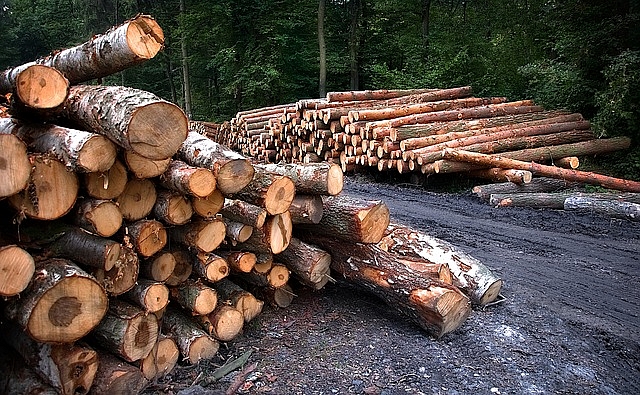Another record year for forestry industry exports
Forestry in brief:
• Forests cover 3.383 million hectares in Latvia, or 52% of the country’s territory, which ranks Latvia fourth in Europe after Finland, Sweden and Slovenia;
• The growing stock of Latvian woods is 670 million cubic meters. Each year, 12 million cubic meters of wood is logged from Latvia’s forests, however, the annual increase in growing stock is two-times more- at least 25 million cubic meters;
• The state owns 50% of Latvia’s forests; 35% are owned by private individuals, 15% by legal entities;
• 34% of Latvian forests are made up of pine trees, 17.9% - fir trees, 30.9% - birch trees, 5.6% - aspen, 7.5% - grey alder, 3% - black alder, 0.3% - oak, 0.5% - ash, with 0.5% other species of trees;
• Latvia has an active forest regeneration program in place, meaning that basically for every tree cut down, two must be planted in its place. If in 2010 32,200 hectares of forests were replanted, in 2014 this figure increased to 38,000 hectares, but in 2016 – 41,700 hectares.
Key facts about the industry:
• The forest industry makes up about 5% of GDP. The timber industry is the second largest industry in terms of exports, making up about roughly 20% of total exports;
• The forest industry exports about 75% of its products. The export structure is made up of: Sawn timber 29%, timber 26.4%, plywood and profiled sawed timber 2%, wood panels 7.1%, plywood 8.2%, packaging 4.1%, carpenter and woodworking accessories 5.1%, wood furniture 6.1%, other types of timber products, including non-professional, 12%;
• There are 1,343 companies with an annual turnover of more than EUR 145,000 operating in the industry. Their aggregate annual profit exceeds EUR 184 million, while turnover exceeds EUR 3.385 billion;
• 12% percent of these companies have foreign capital. 15% of companies with foreign capital operate in the wood processing sector, 10% - in the furniture sector, 8% - in the logging sector.
• The industry employs some 31,000 people, which is 7% of non-budget jobs;
Another record year
Last year Latvia exported EUR 2.102 billion worth of forestry industry products, which is a record high amount or up 4.6% from 2015, the Latvian Agriculture Ministry said.
Timber and timber products made up the bulk of the total forestry product exports in 2016, accounting for EUR 1.794 billion and growing 5% year-on-year.
Last year Latvia supplied its forestry products mainly to the UK (19.7%), Estonia (9.9%) and Germany (9.8%). Forestry industry exports to the United Kingdom reached a value of EUR 414.977 million last year, exports to Estonia reached EUR 207.981 million, while exports to Germany reached EUR 205.015 million.
Imports of forestry products last year rose 9.2% to EUR 741.463.
The main import partners were Lithuania (17.6%) supplying EUR 130.653 million worth of forestry products to Latvia, Estonia (12.9%) supplying products for EUR 95.912 million, and Russia (12.6%), supplying products for EUR 93.415 million.
Biggest disappointment of the year for timber industry – Brexit
The loss of the Russian market three years ago did not hit the timber and forestry industry as hard as the agriculture and food industries, as only about 1.5% of total forestry exports went to Russia. Last year, Latvia supplied its forestry products mainly to the UK (19.7%), Estonia (9.9%) and Germany (9.8%). Forestry industry exports to the United Kingdom reached a value of EUR 414.977 million last year, exports to Estonia reached EUR 207.981 million, while exports to Germany reached EUR 205.015 million. However, an unexpected and unpleasant surprise for the industry was the Brexit vote in the United Kingdom. Brexit means sustained uncertainty for the industry as there is a drop in construction volumes expected in the UK, meaning that there will also be a fall in exports to this country. Furthermore, there are also concerns about increasing competition from the Swedish timber industry. Since it is not known how long the withdrawal process from the EU will take, this means sustained uncertainty for those businesses operating in the UK market, the executive director of the Latvian Forest Industry Federation Kristaps Klauss points out. It is clear that investments in the UK’s construction sector will slow down for a while, but this does not mean a reduction in the export of timber products, as at least 50% of timber products are used for construction and furniture production. Another hit to the industry was the fall in the value of the British pound, as agreements are made in this currency, meaning that they bring in less when converted to the euro currency. Furthermore, the fluctuation of the British pound is good news for the Swedish timber industry, as the fall in the value of the Swedish krona allows these companies to become more competitive when compared to those operating in the eurozone.
Swedes still interested in purchasing forests in Latvia
Swedish investors are still interested in purchasing Latvian forests, or more precisely forest land which has been already been cut with the aim of re-growing the forest, the executive director and board member of Swedish company Bergvik Skog Lars George Hedlund said, which is the largest private owner of Latvian forests. The concern owns 110,000 hectares of land throughout Latvia, including 80,000 hectares of forests, which is 2.5% of Latvia’s total forested area. The company’s strategy foresees the purchase of land, investing in its rejuvenation, selling the timber and then re-investing around 10% of revenue to rejuvenate these forests once more. At the same time, Sweden’s IKEA furniture group also retains interest in Latvian, as well as Estonian and Lithuanian, forests. IKEA currently owns 38,000 hectares of forest in the three Baltic states, which is a rise by 52 percent when compared to the previous year. The company owns 22,000 hectares of forest in Latvia, 10,000 hectares in Lithuania and 6,000 hectares in Estonia.
Flagship expands factory in Estonia
The joint-stock Latvian wood processing concern Latvijas Finieris unveiled the expansion of its factory in Estonia’s Kohila in November. The concern’s investments in Estonia have reached EUR 80 million. When the Kohila birch plywood plant gets up and running and its product portfolio stabilizes, turnover is expected to reach EUR 40 million in few years. The plant in Estonia will be making plywood under the Riga brand name and will export about 95% of output to EU member states and also to the countries in Asia, North America, New Zealand and Australia. The group's strategy provides for further growth of Baltic operations. In previous years, Latvijas Finieris opened production plants not only in Estonia but also in Lithuania and Finland and will continue development also in the coming years. The company’s investment program launched in 2014 provides for EUR 280 million of total investments in production development by 2020. The concern will not have any problems receiving deliveries of raw materials. There are over 400,000 forest owners in the Baltics, including 95,000 in Estonia, 120,000 in Latvia and 240,000 in Lithuania.
Latvijas Valsts Meži to provide forestry services for EUR 88 million
Latvijas Valsts Meži (LVM) state-owned forest manager has completed a tender on forestry services for a period until 2021 for the total price of EUR 88,164,089. It is planned that the tree logging will amount to 3,385,200-4,836,000 cubic meters a year. LVM manages 1.63 million hectares of state-owned forest land and every year puts on the market 5-7 million cubic meters of timber. The Agriculture Ministry holds 100% of LVM shares on behalf of the Latvian state.
EUR 14 million in support for the sector
Over EUR 14 million worth of support has been allocated from national and European Union programs to the forestry industry in 2016. EUR 8 million worth of funding was allocated for the expansion of forest areas and the improvement of forest vitality, while EUR 3 million was allocated to set-up monitoring and communications equipment for the monitoring of forests (forest fires, diseases, pests etc). Meanwhile, EUR 3 million was allocated to forest owners as compensation from Natura 2000 for not carrying out any logging or commercial activities in their forests.





